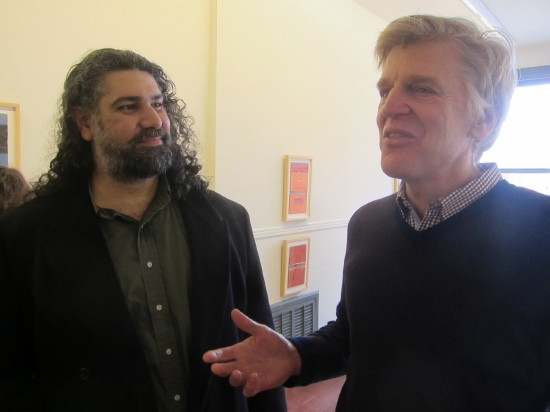
Allan Appel Photo
Pasha with works of Sabti at new Institute Library show.
In 2003, with bullets whizzing by, Esam Pasha climbed a ladder in Baghdad to become one of the first artists to paint over the mural of Saddam Hussein. For the next two years he became an interpreter for coalition troops, saving numberless lives — and earning a huge price on his head.
A decade later he was at the Institute Library finally safe with political asylum and a green card. He was there to talk about the art made from the destroyed books of a Baghdad library he and his mentor Qasim Sabti loved.

The exhibition, Collages by Qasim Sabti: War’s Books, shows 14 collages made entirely from covers, threads, binding and pages from art books Sabti salvaged from the Academy Library destroyed in the invasion of Iraq.
It was organized and curated by Stephen Kobasa. Kobasa called the exhibition “another way into the tradition of resistance” to war, that is, to show books “that are ravaged, that cease to be what they were meant for but are [now] muted witnesses.”

Kobasa’s hanging echoes books on a library’s shelves.
The paradox at the heart of the show is that the works wreaked by destruction are lovely. “That’s the terrible thing about them,” he added.
All 14 untitled pieces constitute what Kobasa called a single work or a “ghost library.” So he has arrayed them with a subdued funereal beauty in the sun-lit Institute Library gallery in a manner that evokes both the living library below and also the tombstones of a graveyard.

With art writer and collector Falk, who was instrumental in Pasha’s gaining political asylum in the U.S.
Pasha’s take is different. He said Sabti ripped open the books, or rather found them torn open and burned, and through a reconfiguration let loose the beauty inside. If one kind of beauty was lost, another emerged. That beauty is not one of content, but of textures, dimpled surfaces, patterns and irregularities not noted before.
“We’re now judging a book by its transformed cover,” said Pasha who continues to do work for the State Department and Department of Homeland Security from his base in New London, where he also continues to make art himself.
From Baghdad To Madison
When Madison-based collector, art historian, and publisher Peter Hastings Falk saw a photo of Pasha’s Baghdad exploits, he got in touch with him via the Internet, which was still operating despite the intense violence in the early stages of the war.
Falk learned that Pasha was not only a young artist, but an Iraqi national judo champion. Pasha also turned out to be a linguist fluent in, of course, Arabic, but also English, German, and French, and capable in Kurdish, Russian, and Turkish. He became lead interpreter for American forces, accompanying the tanks through Baghdad.

By 2005, Falk said, Pasha was at the top of a terrorists’ hit list. Falk told him to get out of Iraq, and helped him do so by buying his works. That gave him enough money, and with connections, he got to Jordan. In 2006, Falk picked him up at JFK.
Shortly afterwards Pasha helped Falk organize a show of modern Iraqi artists, including Sabti, whom Falk had never heard of, although he was the central figure among modern artists in Iraq. That show, at the Pomegranate Gallery in Soho, attracted international attention.
In 2008 Falk organized a consortium that bought all 200 works in Sabti’s War Books project. Fourteen of those are in Falk’s private collection. Kobasa visited Falk in 2009 and said he wanted the show but at the time didn’t have the space to curate it.
Now he does.
“I can’t think of a more appropriate space than the [Institute] library,” said Falk.
In addition to the quiet beauty of the work, their context is also a portal to remarkable stories, such as both Sabti’s and Pasha’s, that are beginning to emerge as American forces finally wind down their activities in Iraq. Pasha said he is working on a memoir, but slowly.
Falk said that before he was able to leave, Pasha could not get any pigment to do his own art work due to the embargo. He looked around his studio and saw only crayons. So he melted them and created large encaustic paintings running with flaming colors, a reflection of the fires and bombings in the night skies of Iraq.
“He’s one of the great unsung heroes,” said Falk

Of all the salvaged covers, only one was legible in its entirety, a title “Desecration,” said Falk.
Pasha calmly recollects how in the days after the invasion he, Sabti, and other artists literally bought back their own works as well as master works from the Baghdad museum, which had been looted and put instantly up for sale in a kind of pop-up black market in the neighborhood.
He was in the Iraqi Army himself before the American invasion and he loved the order, the efficiency. His father is currently a major general; the Pasha family has a military history going back a century.
“Have I failed in my life because I’ve not become an officer?” Pasha asked rhetorically.
But his life now is in the United States, he said, as he walked, with a cane of his own fashioning, about the library taking in his friend Sabti’s work.
What was his assessment of the war and value of the taking down of Saddam Hussein?
Pasha replied: “I removed the tumor, but we lost the whole leg.”
The show, which runs through March 23, is viewable during Institute Library hours